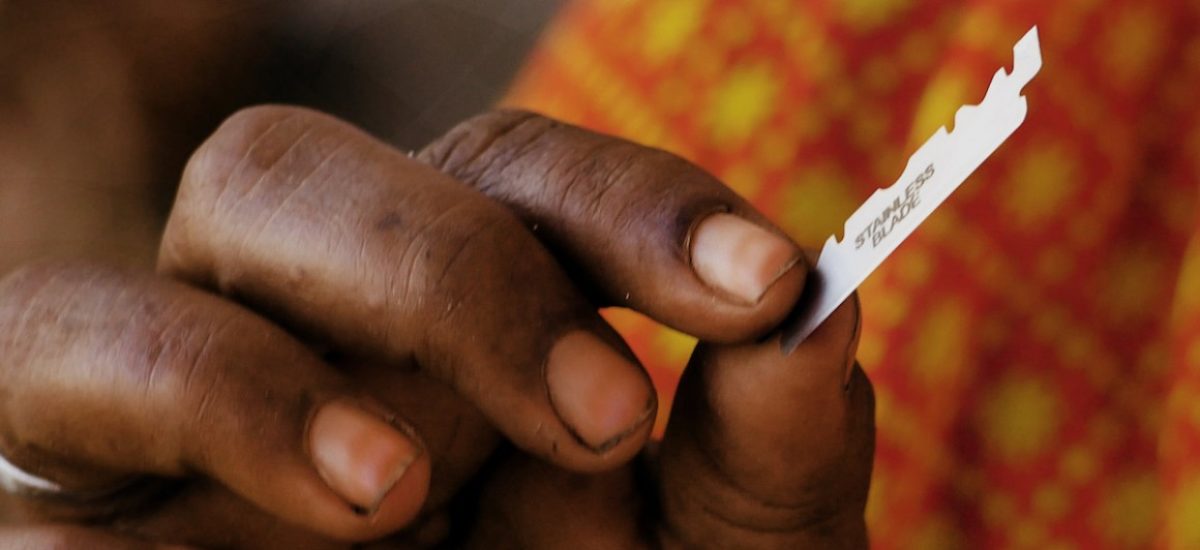Photo courtesy of NNN
Today is the International Day of Zero Tolerance for Female Genital Mutilation
In a tribal region of Afghanistan, a sad 10 year old girl, heavily made up and veiled, sits silently at her wedding ceremony to a 70 year old man. In a rural village in China, old women hobble along on tiny feet with toes fused from decades of binding. In India, a woman aborts a female foetus after a scan reveals the sex of her baby.
These are just three examples of traditional cultural practices that harm women and serve as a means to subjugate and control them; in many instances, these practices are directly linked to religion, another weapon of discrimination against women.
One of the most widely practiced customs is Female Genital Mutilation (FGM) – a barbaric tradition carried out in the name of culture and religion across the world, affecting the physical and psychological wellbeing of millions of women.
“It comprises all procedures that involve altering or injuring the female genitalia for non-medical reasons and is recognized internationally as a violation of the human rights, the health and the integrity of girls and women. Girls who undergo female genital mutilation face short term complications such as severe pain, shock, excessive bleeding, infections, and difficulty in passing urine, as well as long term consequences for their sexual and reproductive health and mental health,” according to the UN.
One of the UN’s Sustainable Development Goals is to end FGM by 2030. In 2021 alone, there are 4.16 million girls around the world who are at risk of undergoing FGM.
In Sri Lanka FGM is not a criminal act. It is practised within the Dawoodi Bohra community. Girls are cut at the age of seven and the practice is known as khatna. In the Moor and Malay communities, girls are cut on the 40th day after birth, often by traditional practitioners known as Osthi Maamis (barber women).
“FGM in Sri Lanka is practised in secret, as a discreet and private event in a woman’s life which is also intertwined with social convention. Coupled with the secrecy surrounding the practice, there is an absence of legislation directly addressing FGM in Sri Lanka. While various women’s rights groups have consistently raised the need for the introduction and implementation of law and policy to address FGM, effective action has not been taken to prohibit the practice,” according to a recent report by the Centre for Policy Alternatives (CPA) on legal reform to combat sexual and gender-based violence.
The report pointed out that FGM was a violation of the right to equality and non-discrimination guaranteed under Article 12 of the Constitution. The state had also ratified the Convention on the Elimination of All Forms of Discrimination against Women (CEDAW) and the Convention on Rights of the Child (CRC) in 1981 and 1990.
The CPA report said that criminalising legislation, along with raising awareness, would lead to the elimination of FGM. However it pointed out that the support of communities was essential for legislation to be effective. “Discussions and awareness programmes about FGM should also be conducted in a respectful, non-judgmental and non-paternalistic manner,” the report said.
Muslim women have been campaigning for FGM to be eradicated from Sri Lanka. In December 2017, 15 testimonials were submitted to the National Child Protection Authority, multiple parliamentary committees and the Human Rights Commission by women survivors and activists and is the first official submission to authorities on FGM. In May 2018, Dr Anil Jaisinghe, then Director General of Health Services, issued a circular prohibiting medical practitioners from carrying out female circumcision.
The resistance to criminalising FGM comes from conservative Muslim groups consisting mostly of men, such the All Ceylon Jamiyathul Ulema (which has issued a ruling making female circumcision compulsory), the Centre for Islamic Studies and the All Ceylon Young Muslim Men’s Association Conference.
The government’s ban on medical practitioners carrying out female circumcision was condemned by the Centre for Islamic Studies, which claimed that the decision was an affront that violated their religious rights. It argued that female circumcision was just a nick not mutilation and should not be classified according to the WHO definitions, calling it a religious obligation and not a dangerous practice.
The UNFPA estimated that at least 59 countries have passed laws against FGM. Of the 29 countries in Africa where FGM is traditionally practiced, 26 have laws prohibiting FGM. Penalties range from monetary fines to a minimum of three months to life in prison.
In its 44th session, the UN Human Rights Council passed a strong resolution on the ‘Elimination of Female Genital Mutilation’ calling on governments to take “comprehensive, multisectoral and rights-based measures to prevent and eliminate female genital mutilation”.
Reflecting the values and beliefs of a community, cultural practices that harm women continue to be followed despite their violation of international human rights laws because they are not questioned and are seen as moral or pious.
“Female sexual control by men, and the economic and political subordination of women, perpetuate the inferior status of women and inhibit structural and attitudinal changes necessary to eliminate gender inequality,” according to a UN fact sheet on harmful traditional practices affecting the health of women and children.
Although the UN had been aware of many harmful cultural practices since the 1950s, the international community did not act because they were seen as “sensitive cultural issues falling within the spheres of women and the family”.
Gradually, however, cultural practices that violated the dignity, health and basic human rights of women were recognised as deserving of attention. The slogan “Women’s Rights are Human Rights” was adopted at the World Conference on Human Rights in Vienna in 1993 and the Declaration on the Elimination of Violence against Women was adopted by the General Assembly in the same year.
According to a 2019 study commissioned by the Family Planning Association (FPA), most doctors in Sri Lanka did not even know that such a practice was taking place.
The main findings of the study were: Female genital cutting is not practiced by all Muslim communities; the conversation on FGM was evolving and women needed conversation starters, information and solidarity; there were no conversations on bodily integrity, sexual rights and pleasure for women; and there was no formal medical training on FGM, which doctors were reluctant to speak about.
While there were no official statistics on how many women have been subject to FGM in Sri Lanka, the FPA’s report contained interviews with 26 victims who described the impact FGM has had on their lives. Most of them said their relatives and friends had done it to their daughters. The women gave these reasons for undergoing FGM: it was a religious requirement, a means of establishing a Muslim identity, necessary to control women’s sexual feelings, medically beneficial, a tradition or customary ritual, improved the appearance of female genitalia, improved sexual partners’ interest and improved sexual experience.
Here are three victim statements contained in the FPA report:
“I got scared and wondered what had happened, to what extent. I felt lost because I didn’t know what had happened to me. This practice is an invasion of my body and something I didn’t consent to. Now that I know, I can never go back to a normal state. It is not possible to be unaffected by it, it does shape you a bit.” Sarah, Dawoodi Bohra, Colombo.
“I’m a victim of Female Genital Mutilation, I refuse to call it circumcision since what was done to me was no mere ‘prick’, ‘nick’ or ‘cut.’” Jamila, Dawoodi Bohra, Colombo.
“It should not be up to the elders to stamp the body of a girl child at the age of seven, (a process that is irreversible irrespective of the extent of damage), and decide what her religious convictions should be.” Jamila, Dawoodi Bohra, Colombo.


